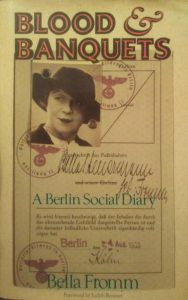Bella Fromm’s Berlin Social Diary
Over the last four years, I’ve read a lot of memoirs and diaries written by people who lived in Berlin in the period between the two world wars. They are a wonderful source to use to enrich a story. They not only allow you to look at incidents from different perspectives but, depending on the author, they can give you details that it is impossible to get any other way. *
Most of the memoirs I used were written by American foreign correspondents stationed in Berlin. One memoir stands out because it was written from a different perspective: Bella Fromm’s Blood and Banquets: A Berlin Social Diary, published in 1942 once she was safely in the United States.
Bella Fromm (1890-1972) was a member of a family of wealthy Jewish wine merchants with long standing roots in Germany and connections with highest ranks of German society, including the Bavaria royal family. The inflation that wracked Germany’s economy in 1923 destroyed the family fortune. Forced to look for work, she used her family social contacts to get a job as a reporter with the Jewish-owned Ullstein conglomerate, one of the largest publishing companies in Europe.
At first, like most women reporters of the period, she worked primarily as a social reporter, aided by her contacts throughout Germany society. But she was talented and ambitious, and those same contacts that got her into the big social events also gave her access to government and diplomatic circles. She soon began writing about politics in addition to parties.
Within months of Hitler’s appointment as chancellor, Germany no longer had a free press. The Nazis shut down hundreds of opposition newspapers. They seized papers owned by the communist and Social Democratic parties as well as Jewish-owned publishing companies, including Ullstein. The few “independent“ papers that survived were effectively under the control of the Propaganda Ministry.**
Fromm’s position as a journalist was increasingly precarious, though she was protected to some extent by her friendships with foreign diplomats and conservative members of the Nazi government. After 1934, when the Nazis seized the Ullstein companies, she was no longer able to publish under her own name, though she continued to publish some articles without a byline.
Unable to support herself entirely by journalism, she returned to her family business as a wine merchant. She sent her daughter to the United States in 1933, but stayed in Germany as long as she felt she could use her contacts to help other German Jews get visas. She finally left in September 1938, after Jews were excluded from the wine trade, leaving her without an income.
At the time of its publication, Blood and Banquets was promoted as a secret diary smuggled out of Germany under the Nazis noses. Some scholars now believe it was written in the United States after she left Germany.*** Nonetheless, it remains a useful picture of life in Berlin from the perspective of a German-Jewish journalist.
*I wrote about this at some length in my newsletter back in May, 2021, if you want to know more.
**There’s a reason freedom of speech is the first amendment in the United States Bill of rights. A free press is a cornerstone of democracy.
***One of the arguments they use to suggest that she was not particularly important is that she does not appear in William Shirer’s Berlin Diaries, which was a huge success when it was published in 1941 and continues to be widely read, unlike the memoirs of many of his contemporaries. By that standard, many people would be erroneously dismissed as unimportant. What’s more, Shirer does not appear in Fromm’s book. They ran in different circles.****
****Sigrid Schultz, who appears to have known everyone, appears in both books.





